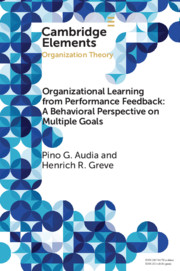In the behavioral theory of the firm, decision-makers' interpretation of performance feedback information is the fundamental intermediate step between the evaluation of performance and the consequent strategic decision-making. However, such interpretations can be shaped or even distorted by the cognitive lens taken by decision-makers, such as their time concept in terms of biased cognitions of the importance and imminence of the future over the present. This study focuses on the role of a specific temporal bias (the time concept expressed in languages) in shaping the response to performance feedback. On the basis of the baseline proposition of a positive relationship between the underperformance duration (a temporal dimension of performance feedback) and acquisition behavior, we theorize and empirically examine how the future-time reference (FTR) of languages under different conditions shapes the way firms respond to repeated performance shortfalls. Using a sample of 12,309 firms from 12 countries between 2007 and 2019, we find that the FTR weakens the connection between the underperformance duration and subsequent acquisitions. Moreover, slack resources strengthen, whereas political stability weakens, this moderating effect of FTR on the underperformance duration–firm acquisition relationship.
